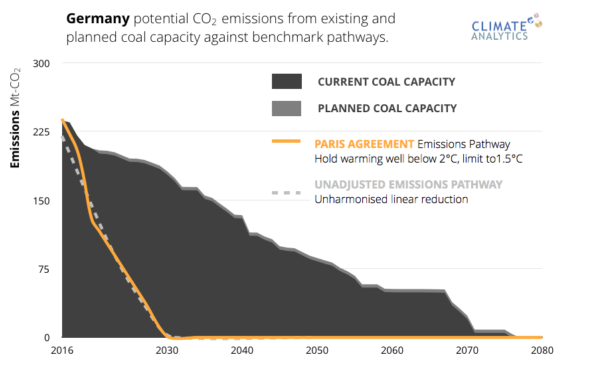Germany needs to exit coal by 2030 to meet Paris Agreement 1.5˚C limit: report
Share

“By rapidly phasing coal out of its electricity system by 2030, Germany could meet its 2020 emissions target, make massive health gains across the nation through reduced air pollution, and regain much needed momentum for a successful German ‘Energiewende’,” said Dr Carl-Friedrich Schleussner, Head of Science and Impacts at Climate Analytics.
The report, ‘Science based coal phase-out pathway for Germany in line with the Paris Agreement 1.5°C warming limit’, examines for the first time what Germany will need to do in its power sector in order to live up to the Paris Agreement goal to limit global warming to 1.5°C. The Intergovernmental Panel on Climate Change (IPCC) Special Report on 1.5oC showed deep reductions are needed globally by 2030, and an almost complete exit of coal from the power sector by 2050.
Germany is the EU’s largest greenhouse gas emitter and generates more than a third of its electricity from coal, the most polluting fossil fuel. A number of other EU nations are set to phase out coal completely within a decade, but Germany is still in the process of deciding on a date.
The Climate Analytics report coincides with the 24 October meeting of Germany’s Coal Commission, the body tasked with setting a coal phase-out date, and proposing ways to meet the government’s target of cutting carbon emissions by 40% from 1990 levels by 2020 – which Germany is currently failing to meet.
“With the scientific community and governments moving to now identify 1.5°C as an upper warming limit for climate policy, in part driven by the very substantial work of German scientists, the work of the Coal Commission is of global significance. The phase-out date for coal it will recommend for Germany will send a globally relevant signal,” said report Dr Bill Hare, CEO of Climate Analytics.
“A structured coal phase-out plan for 2030, along with intermediate plant shut down by 2020 to meet long standing goals, would signal to the rest of the EU countries and the international community that Germany remains serious about fighting climate change and implementing the Paris Agreement – and would re-boot its reputation as a climate leader,” said Paola Yanguas Parra, study leader and Climate Policy Analyst at Climate Analytics.
The report also shows that in order to meet Germany’s longstanding 2020 national emission reduction target coal CO2 emissions need to be reduced by 42% below 2017 levels by 2020, equivalent to a 60% cut from 1990 levels.
“According to the pathway we propose in this report, about 16 gigawatts (GW) of generating capacity would need to be retired by 2020, which would be a significant step towards meeting Germany’s 2020 emission reduction target” said Parra.
A coal exit from electricity generation by 2030 in Germany would bring huge benefits for public health, the report finds, and therefore for health expenditure.
“More than half of the air pollutant emissions from Nitrogen Oxides (NOx), Sulphur Oxides (SOx), primary particulate matter (PM10) and mercury emitted by German coal power plants until 2030 could be avoided. Likewise, all of the related health impacts we looked at would be more than halved compared to a business as usual scenario,” said Dr Schleussner,
The report proposes two concrete Paris Agreement-compatible schedules for phasing out coal-fired power stations. Under the ‘Regulator’s Perspective’, the most polluting plants would be closed down first. The ‘Owner’s Perspective’ would instead close down the least economic units first.
Under a planned and structured coal phase-out, energy security and reliability of electricity supply is not expected to be a major concern and will be manageable. As well as reduced health impacts, both proposed shutdown schedules bring added benefits in job creation, helping to smooth the transition to a zero-carbon energy system and potentially bringing benefits to communities adversely affected by the shutdown.
The report concludes that delaying the coal exit beyond 2030 would result in a much less smooth transition, with adverse social and economic consequences.
“Delaying the coal phase-out would result in much more drastic and potentially more disruptive plant closures in order to get back on track for the Paris Agreement 1.5°C limit, which Germany agreed to by signing the Paris Agreement,” said Hare.
“Germany’s historic lead on fighting climate change and spearheading energy transformation with the ‘Energiewende’ has had a global effect and has helped create the pre-conditions for rapid global action now, and now the next big challenge is the phase-out of coal from power generation by 2030”, said Dr Schleussner.

A coal exit from electricity generation by 2030 in Germany would bring huge benefits for public health, the report finds, and therefore for health expenditure.
“More than half of the air pollutant emissions from Nitrogen Oxides (NOx), Sulphur Oxides (SOx), primary particulate matter (PM10) and mercury emitted by German coal power plants until 2030 could be avoided. Likewise, all of the related health impacts we looked at would be more than halved compared to a business as usual scenario,” said Dr Schleussner,
The report proposes two concrete Paris Agreement-compatible schedules for phasing out coal-fired power stations. Under the ‘Regulator’s Perspective’, the most polluting plants would be closed down first. The ‘Owner’s Perspective’ would instead close down the least economic units first.
Under a planned and structured coal phase-out, energy security and reliability of electricity supply is not expected to be a major concern and will be manageable. As well as reduced health impacts, both proposed shutdown schedules bring added benefits in job creation, helping to smooth the transition to a zero-carbon energy system and potentially bringing benefits to communities adversely affected by the shutdown.
The report concludes that delaying the coal exit beyond 2030 would result in a much less smooth transition, with adverse social and economic consequences.
“Delaying the coal phase-out would result in much more drastic and potentially more disruptive plant closures in order to get back on track for the Paris Agreement 1.5°C limit, which Germany agreed to by signing the Paris Agreement,” said Hare.
“Germany’s historic lead on fighting climate change and spearheading energy transformation with the ‘Energiewende’ has had a global effect and has helped create the pre-conditions for rapid global action now, and now the next big challenge is the phase-out of coal from power generation by 2030”, said Dr Schleussner.











